Question: Everyone says that adoption is different now than it was in previous eras.
Is it really? Is it actually different for adoptees? Even with open adoptions, the adoptee will still have to process all it means to be adopted. Are the adoptive parents really ready and willing to do this alongside their son or daughter?
I see posts from adoptive parents that show they can’t or don’t want to deal with issues of rejection or low self-esteem or the whys of adoption. They don’t say that, of course. Instead I see them congratulate themselves for helping their child stop feeling those feelings, but it seems to me that they’re really stopping the child from expressing those feelings.
The adoptee’s needs cannot be met when adoption is hyped as solely a positive event. Until parents treat it as a neutral fact of how they build their family, and until they deal with their own stuff and acknowledge the complexity of adoption, the adoptee experience is not much changed.
Really. Tell me how adoption is different these days.
— TAO
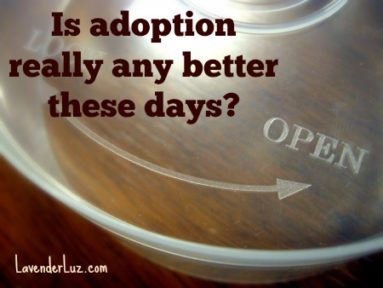
Still in the Dark Ages?
Dear TAO: This is such a worthwhile issue to ponder. You’ve had me thinking about it for several weeks.
I admit it. I get discouraged sometimes about how in-the-dark some still are about adoptive parenting, how stuck in the closed era the general mindset still seems to be. As a result, many come to parenting ill-prepared for the challenges of raising a son or daughter who, because of adoption, has experienced a split between their biology and their biography.
Is it because some states don’t require enough in the way of education about adoptive parenting? Indeed, many states don’t even require that a licensed adoption agency be involved. And when one IS involved, is it adequately preparing its clients for the “marriage” — long-term parenting through the ages and stages of an adoptee processing her adoptedness? Or does the agency focus primarily on the “wedding” — the short-term goal of filling the crib?
I wonder if too many agencies perpetuate the “as if” paradigm, that we can all act as if an adoption hadn’t taken place, that transfamilial parenting is no different than biological parenting. Too many hopeful parents do not understand that there IS a difference — especially to the adopted person.
(There are, of course, some agencies who ARE trying to raise the bar and better educate their clients on the realities and complexities of adoptive parenting. I give them shout outs on occasion.)
Encouraging Signs
Still, there encouraging signs. Activists are effecting change in state legislatures across the country, as one-by-one, states restore the civil right to adopted adults to access their own birth records (Texas, you ARE going to open — you all will).
In addition, the Washington Times reported a few years ago that “95 percent of U.S. infant adoptions now have some level of openness between birth parents and adoptive parents, unlike earlier decades, when such contact was routinely denied.”
This is encouraging, right?
Not so fast. It can be perilous to confuse true openness with mere contact. As I’ve said before, “if you have contact between families but are not also parenting with mindfulness and attunement, you may be inviting in complexity (contact) without having ways to deal with such complexity (openness, mindfulness, intentionality).”
I saw this evolution in my self. At first, I thought that contact was the salve that would prevent problems for my kids. Now I see that in some cases, contact can actually ADD to problems, or at least to complexity. I now see that adoptive parents need to parent with openness, an ongoing cultivation of an open channel between themselves and their child. Which means parents remain aware of what’s going on inside them. Which means parents continually scan for their own triggers and hot buttons and defuse them, before their child finds one.
Out with the Old; In with Adoptee-Centered
When people know better, they do better, and thanks to the uprising of adoptee and first parent voices, we now know so much more than we used to about the effect of adoption — and of closedness and openness (not just contact) — our on our children.
But it’s still up to adoptive parents to take the information and use it all along the way. Getting a baby isn’t the end of the story — it’s just the beginning.
One reason I wrote my book was that I knew there were thousands of adoptive parents who wanted to do better but weren’t sure how. I am pretty sure most parents want to do the best they can by their kids. We need to replace the old closed paradigm with something that is more adoptee-centered.
Calling on readers: Do you think adoption is better these days? If so, how? What do you see that’s working?
See also:
- The Open-Hearted Way to Open Adoption
- Notes from the 2016 Conference of the American Adoption Congress workshop: “Blazing Subtle Trails: Reforming through the Heart,”
- The Open Adoption Grid: How contact and openness are two different measures.
About this Open Adoption Advice Column
- I occasionally call on others to help with answers, to tap into group wisdom.
- I am not trained as a therapist. Please do not rely on words in this space to make your own major or minor decisions.
- Readers are encouraged to weigh in thoughtfully and respectfully. Remember that this is a teaching endeavor rather than a shaming endeavor, and that we aim to bring light rather than heat. It’s my belief that people do the best they can with what they have to work with, and our goal is to give folks more to work with.
Send in your own open adoption question. I’ll either offer an answer or find someone who can address your issue.
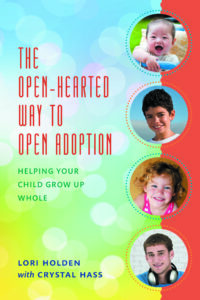
Lori Holden, mom of a young adult daughter and a young adult son, writes from Denver. She was honored as an Angel in Adoption® by the Congressional Coalition on Adoption Institute.
Her first book, The Open-Hearted Way to Open Adoption: Helping Your Child Grow Up Whole, makes a thoughtful anytime gift for the adoptive families in your life. Her second book, Standing Room Only: How to Be THAT Yoga Teacher is now available in paperback, and her third book, Adoption Unfiltered, is now available through your favorite bookseller!
Find Lori’s books on her Amazon Author page and catch episodes of Adoption: The Long View wherever you get your podcasts.

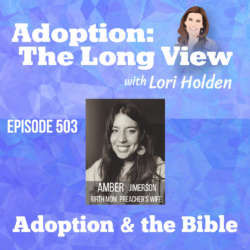
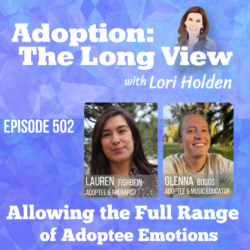
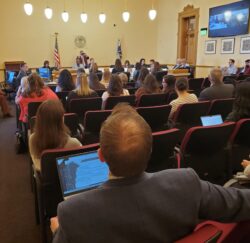
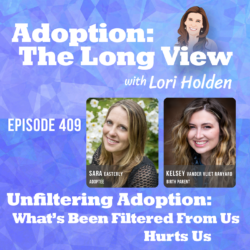
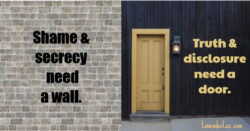
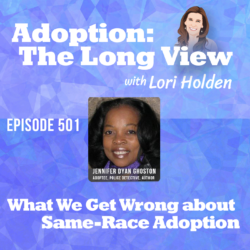
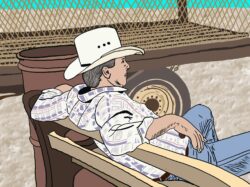
40 Responses
Another superb post; thank you for sharing it!
I can’t say better or worse, but I can say “different” for many of the reasons you listed above. But I really like that distinction of preparing for a marriage vs. preparing for a wedding. Weddings are nice, but they’re one day, and if that day is a big focus, you’re probably going to run into problems in the ever after. And the same goes for parenting any child — those first moments of forming a family are important, but you need to be committed to doing the work forever, not just when they’re sweet infant.
Completely agree with this. With all parenting, there’s too much focus on the “wedding” (bringing home an infant or child) and less on the marriage (the life-long relationship with the child). Though there is a lot of excitement about this initial celebration and transition, there’s been too little focus on fostering the relationship, including addressing any hurts that may have come to form this family.
Thank you for starting this conversation, Lori! The only way I’m pretty sure adoption is better today, is because all the adoptive parents I know WANT to be open with their children. At the same time, we all mess it up (at least I’m sure I do) because each of our children is an individual with individual thoughts, needs, and hunger for specific information. Openness has to look different for my two different children because they’re open with me that they have a different comfort level with their past.
But, at least we’re not a generation that [generally] hides adoption from our children or pretends it isn’t part of their story.
Yet, I’m sure in five years, I’ll know a ton I will have wished I knew now.
With the widespread trend towards open adoption since the ’80’s, I think adoption is much better. My cousin was adopted in the late seventies and the adoption is closed. He cannot find any information about his birth family because they never put themselves into the database so that they could be found. Although what adopted children find might not be good. My children’s adoptions were fully open, but we had to stop visits with one and stop contact totally with the other. They became very troubled and couldn’t maintain a healthy relationship with us. I hope my children will not be negatively affected by these facts.
If you got a restraining order against their family for harassment it would mean cutting contact was justifiable to an objective third party and it will be less likely an adopted person would feel resentful. But if you just did not like how they acted you can expect resentment from the kid and their family. Be surprised if they don’t.
What adopted “children” find, or adult adoptees? What I learned during reunion with my father at age 12 and my mother at 26 was that my paternal aunt who had adopted me (at age 3) lied. As for relationships, I agree with Marilynn about expecting resentment from adopted kids when the APs cut off contact of their own volition. Regardless of the level of openness, APs are still (especially perceived by adoptees) the ones who hold all the cards. If it’s a matter of feeling uncomfortable around the child’s blood parents, relationship boundary issues (legal agreement or not, they still have a parent-child relationship) cutting them out is not going to resolve anything – or model healthy relationships for the children you share.
Too many adoptees have problems with boundaries in relationships, and not just with parents. It isn’t natural to have two sets of parents or to have one’s natural love and loyalty toward the blood parents squashed by the adoptive set. And with all due respect, unless they are being abused or threatened, the children’s relationships with the blood parents are not up to you to manipulate, Lisa – you say they “couldn’t maintain healthy relationships with you”? Maybe it was hard on them to watch their children being raised in an adoptive home and they felt as if their own feelings weren’t being respected? The day will come when they won’t need your permission to spend time together. Your actions and responses while they are children have a great deal of influence over the relationships they’ll have as adults.
Having more than two parents is more common today and it goes beyond just adoption. With divorce there are many people with 3-4 parents. I personally know people who are closer with their step parents than they are their parents.
While it may have seemed unnatural in the past having 3-4 parents is more common and accepted today.
I too loved the marriage-wedding comparison. It would be easy for infertile couples to focus on the end goal – as you said – of the baby in the cot (as we would say in NZ). And of course the Just-Adopt brigade don’t think beyond that. I am so glad there are people like you showing the way.
I think going toward a marriage model legally would be far preferable than the current legal reduction of rights and altering of identity. If the adopted person simply joined the family without having their birth record as happens with people who get married they are family in their own right but it does not change their legal rights in their own families. Also marriage can be ended by either party without proving fault – it does not pretend to be permanent.
I agree. Marriage doesn’t deny family of origin or sever one’s relationships with them; marriage doesn’t necessarily mean changing your name anymore either. It would certainly allow the adoptee and blood family more rights and perhaps make things more equal.
And I think it’s great that you’re focused on the long term relationships in adoption (and all their complexities) instead of just bringing a baby home.
On the one hand, it is better. There’s less secrecy and shame associated with adoption and there is a push for contact. But, just as you stated, contact doesn’t mean openness and we still have a long way to go on this matter.
One model I would like to see more with adoption agencies is the fostering of a life-time connection with the families involved in this process. This means continual access to education and counseling resources for the first parents, adoptive parents and the adoptees. I know only a few agencies that offer this resource, but the benefits they see and foster really help all members of the triad.
Lori I was trying to make sense of a phrase you and others use a lot when writing about adopted people’s common experience; you wrote in this post and others about them having a split between biography and biology.
Before my understanding of the word did match the definition in Websters dictionary:
” the story of a real person’s life written by someone other than that person”
https://www.merriamwebster.com/dictionary/biography
So you are saying that a written account of someone’s life by another person would usually accurately reflect them to be the child of their parents and a member of their maternal and paternal family, whereas the written account of adopted people’s lives does not accurately reflect them to be the child of their parents and a member of their maternal and paternal families?
That does make sense that what is written down about adopted people by others is in a sense a biography or biographical sketch. Typically the biographical sketch will be accurate if not sometimes incomplete for the name of their father. Which is the same for people who are not adopted but then people who are adopted are subjected to having this essentially unauthorized biography written by people who alter the facts to not identify them as their parents child.
I guess I agree with you if this is what you mean – the story of who they are does get altered and there is a disconnect or split between who they really are and are the child of biologically and the revised biographical information that is issued when they get adopted
.I was thinking that this does make sense to me based on the meanings of the words you used and it is in fact a split between who they are and who others want them to be so badly they re-write the story of their life on their identifying records.
I thought maybe you might have meant the word biography to mean something other than the story of someone’s life written by someone else. Do you mean an adoptees life story as written by others? When you talk about their biography? Do you mean auto biography as told by them?
Hi, Marilynn.
By “biology,” I refer to the DNA a person is born with. (I realize that this issue can be further complicated in cases in which the egg and the womb are not from the same woman. In that case, “genetic” would be more precise.)
By “biography,” I mean the story that is co-created by those we call family. I include the subject of the story as one of the creators of the story.
Thanks Marilynn for sharing. Our experience is sooo complicated that it resulted in contact being impossible. We will help our children understand and have faith that they will be fine.
[This portion edited for kindness /personal attack.]
I am sick and tired of AP’s who want to take over adoptee brains and make them feel the way they want them to. What a science fiction horror movie, not a life of love.
My comment was to Lisa btw.
I feel like adoption is moving towards a better path, based on what I’ve read and heard from friends who are adoptees of the closed and secretive era. The philosophy of openness, even when a birth parent is not open to contact or one is unknown, seems to be so much less harmful than the sneak attack sudden awareness that your family isn’t what you thought it was, that you have all these missing pieces and that because of closed records it’s nearly impossible to find all those pieces for some. I’m not saying that openness closes up the wound of grief and loss, and I can’t pretend to know what that feels like, just as no one adoptee’s experience is exactly the same as another’s.
I love the agency that my husband and I are working with because they put a lot of emphasis on the marriage — lifelong training, support, groups for adoptees, groups for adoptive parents, groups for birth parents, ongoing counseling support for difficult times of identity crisis, because that WILL come regardless of how open you are (I feel like that’s a typical developmental phase in teenagerdom, and magnified by a feeling of “where do I come from? why didn’t I stay with my first family?”). I can only hope to do the best I can when we successfully adopt our child, to honor every part of him or herself, to share as much information as early as possible so there’s never a sense of withholding, and to get a copy of that original birth certificate. That part bothered me when I read about it, I hadn’t realized that amended birth certificates are issued that erase previous history. I don’t know why they can’t give you both. (I can guess, but it seems wrong to just…erase).
Sorry for such a long comment, but I also think that the public understanding of adoption needs to improve as well. I can’t tell you how many older (and not by much) coworkers of mine have been horrified at the idea of open adoption, of “those people” still having a part in my future child’s life, of a feeling of “won’t that hurt your feelings” or “but it’s YOUR baby!” as if this is a transfer of goods and not a child we’re talking about. It amazes me when people say “they shouldn’t have so many rights” when it comes to choosing to parent or that we have to go through so much to prove our worth as parents. It’s disturbing, to say the least, and I do my best to educate without getting snarky but it’s really hard.
Really I don’t have much to add that’s of practical concern since we are still in the profiling stages of things, but based on what I’ve read, people I’ve talked to, and the amazing services offered by my adoption agency, I do think things are headed in a better, less secretive, less harmful direction that is definitely more adoptee-centered. Not there quite yet, but headed there.
“I hadn’t realized that amended birth certificates are issued that erase previous history. I don’t know why they can’t give you both. (I can guess, but it seems wrong to just…erase).”
You are just embarking on trying to adopt so your opinion would be perfect to know…how would you feel about adopting if the birth certificate was not re-issued at all? So that when they needed to show their birth certificate throughout their lives they just used their birth certificate and if they or you needed to demonstrate authority and custody you just showed the adoption decree? This would be similar to how sometimes parents loose custody and birth certificates are not revised to show that either the mom or dad has sole physical and legal custody, there are court papers to show that if need be. Wouldn’t that be far better than having two birth certificates? Just leave the one they have alone?
I have wished that my children’s amended birth certificates were two part–with a “born-to section” and an “adopted by” section. I would worry if they simply remained in the original form that it might contribute to inheritance and other issues later. Court documents are easy to lose, and in any case might not make it from the parents to the children once they grow up and need their own documentation. In states where adoption records still are sealed, an adopted person might have trouble proving her legal parentage without an amended certificate.
But having a bc that simply shows your adopted children as born to you, besides being dishonest, creates problems for many families. A friend and her son had issues trying to get a drivers license for her Korean son, adopted as a teenager, since his birth certificate showed an “impossible” parental relationship and the DMV clerk wouldn’t accept it. We used to go to Canada frequently, so we traveled with the kids’ birth certificates. The fact that we as white parents had theoretically given birth to African-American children sometimes caused delays at the border.
It is great that even though you have adopted you have the ability to look at the situation objectively which will obviously (to me anyway) result in actual emotional closeness based on respect for the whole person adopted and not just viewing them as eternally children
Since I deal a lot with helping donor offspring and see their falsified birth certificates I take it a step further than not being born to to the people named parents on a birth certificate – it’s not true if the person is not the offspring of the people named parents and it really is not a vital record of anyone’s health or identity in relationship to the person born.
I can see your point about wanting the birth certificate to also include the adoption its nice to have everything all in one place. But really the marriage analogy was used in this post and it makes the point beautifully; you join another family when you are married and you get a certificate for that but it does not change your birth certificate. I don’t know where my marriage certificate or my birth certificate is. I ordered my BC this month because I was starting a new job. If I had to prove I was married for inheritance purposes I would just order a copy of my marriage certificate. If we were being completely fair and truthful to everyone involved adoption decrees would be just another vital record that people and their relatives would have the right to obtain for a fee from their department of public health. If I suspect my father might have been married before or might have had kids before I can go and prove who I am in relation to him and have them look up any birth certificates he’s named father on. Once I have the certificates of my previously unknown half siblings if I was unable to locate them and it appeared they dropped off the face of the earth it sure would be nice to go to the vital records office and have them check to see if their names show up on any adoption decrees the way I currently have the right to see if my siblings names show up on any marriage or divorce records or if their names show up as parents on the birth records of my nieces and nephews. Vital records are able to be accessed by our relatives without our permission even when our relatives are under age. That’s because they help shape our identity in relation to others in the world for instance with the existence of my brother’s offspring I become an aunt and my children suddenly become cousins. Adoption currently interrupts the rights of entire families to information about their relatives and in turn denies them critical information about themselves as well.
So while I don’t think it’s necessary to alter birth certificates to show that your now added to the family of your spouse or now added to the family that you were adopted into, I do feel that everyone should be treated identically and that records should not be modified to make it look like someone is a person’s parent if they are not because it unravels the identities of everyone they are related to. Interestingly step relatives have the right to obtain copies of vital records too and that should be the same for adoptive family as well. If my husband’s name appears as father on the birth certificate la kid that is not mine, I can get a copy because that kid is my step kid which makes me a step mother. If my daughter adopts I can get a copy of her child’s birth certificate currently but I can’t get a copy of the adoption decree. It is not fair that the grandmother of the child my daughter adopts can’t get a copy of the birth certificate and adoption decree either. It should all be just vital records that people within the family, including step and adoptive can access with proper identification as the information on the record relates to them and gives them an understanding of who they are in relation to others in the world. Candor and transparency is I think essential in respectful behavior and there can be no justice for anyone really without it.
With so many blended families I would like to see a Universal change where there is a two page birth certificate the first page showing biological parents (that could never be sealed) and the second page showing legal parents. When applying things such as passport, enrolling in school, drivers license, etc. only the second page would be required. It should be no one’s business whether someone was adopted or has non biological parents every time a birth certificate is required for a person. Making the change universal would mean that every person would have the same documentation though the names on both pages might sometimes be different.
This would also allow openess for adoptees and people conceived via third party reproduction to know their genetic roots while at the same time knowing who are their legal parents. With an Adoption Decree being useless on its own in most places this would be a better solution than current practices.
Yeah but the whole point of a birth certificate is that it does not change every time you change your name or join another family as in marriage like this post was saying it ought to be more like a marriage. Your not showing your birth certificate to identify who your legal parents are your showing it to identify who you actually are originally.
Don’t you see that if they would only have to show the second page with their legal parents then there is still that hidden truth of who they actually are whose child they actually are hiding behind that cover page that they have to present to the world. If they need to prove who they are they should just show their birth certificate and if they need to show that they are adopted they should show their adoption decree like for inheritance purposes but it should not be necessary in order to get a passport as an adult. If their adoptive parents want to get a passport for their adoptive child they might need their adoption decree to apply for one on the adopted child’s behalf but their passport should match their birth certificate unless their name was changed on adoption, which it really should not be. But if the name is changed they just show the adoption decree with the birth certificate its the same thing married women do all the time and really you could say its nobody’s business if someone is married or not when it comes to having a different name on their drivers license than their birth certificate but sometimes you have to show your marriage certificate to substantiate the name change. Its truthful and there is nothing wrong with that. Presenting the wrong people as parents is dishonest and your trying to say that sometimes its OK to be dishonest cause its nobody’s business. They don’t remove parents names when one parent has sole physical and legal custody do they? No, they stay on the birth certificate even thought they are not a legal parent anymore. Would you have people forced to have a blank on their 2nd page birth certificate that only shows legal parents if their father lost custody? He’s still their father it’s not like it’s not still true.
It would only be the second page that would change in cases of adoption in my proposed system. The first page is for geneolgy purposes showing who the biological parents are. The second page is for legal parental status. I don’t see how it would be untruthful if the purpose is to show who the legal parents are if they are adopted they truth is they are the legal parents of that person.
I don’t see the reason to have to show a person is adopted every time they need to enroll a child in school, get a passport, license etc. Its not as if whether a person is adopted or not has any significance in what they are trying to do in those situations. What matters in those situations is knowing who the legal parents are.
Your right but they won’t change their tactics unless we change the law and take “parenthood” off the table for people who adopt a person of any age. If adoption did not sever the legal rights of adopted people in their own families but joined them with the adopted family without changing their names at all especially their surnames, it would go a long way in eliminating the wrong kind of people from adopting.
On the outside of adoption as having no connection to adoption it does appear things are better in adoption today than 30-40 years ago. But I believe there is still a lot of work that needs to be done to make further improvements. I don’t think you’ll ever get it perfect because nothing in life is perfect.
Communication is always the key in any relationship buf is always much harder than it sounds.
I notice that the ones who see positive changes in adoption are adoptive parents, or perspective adoptive parents.
Us adopted ones, are not so sure.
Marylee,
I’m not an Prospective Adoptive Parent. I was one at one time but it’s not something my wife and I will be doing. I think the only way we’ll truly know if it’s better is when this generation of adoptees grow up and provide their feedback.
What is the point of adoptees giving feedback when it never changes anything? The adoption records are not open in most states and the majority of AP’s out there still don’t care about the pain adoption causes kids that are adopted….
[The remainder of this comment has been edited for kindness.]
My state has recently opened records. I do see things changing as a result of listening to adoptees.
Back when my adoptive parents divorced in the early 1960s’ I didn’t know anyone whose parents were divorced. And up until middle-school, I didn’t know anybody who was adopted besides my brother. I believe if anything has changed in adoption is we talk more about openly about adoption which I think would have to be more healthy for adoptees. Just being able to read a story in a magazine or on the television, would have helped me to not feel so disconnected to being adopted. Seeing so many familes today divorced, blended families, single-parents, adoptive and homes with two fathers or two mothers, etc., would have helped me to see I wasn’t alone in trying to figure out where I fit as an adoptee. I wonder if adoptive parents can get a way as much without having to tell their children they were adopted and keep so many secrets as in the past because of modern technology.
Good point about technology.
I was thinking that improvements in the financial safety net for low income parents has really improved parents ability to keep and raise children they would have been forced to give up for adoption 50 years ago. The law itself has not changed but I think adoptive parents are just sort of reacting to the conditional nature of the relinquishment – ie only with regular contact.
Marilynn
” Presenting the wrong people as parents is dishonest and your trying to say that sometimes its OK to be dishonest cause its nobody’s business.”
Presenting people as the biological/genetic parents when they are not is indeed dishonest, and in some case problematic for practical reasons as well. But–and I do realize I’m speaking from my adoptive parent perspective here–it is not dishonest to say I am my childrens’ parent. I’m not their only parent, but legally and functionally I am one of their parents.
Whether they claim me, or their birthmother, emotionally as their “real mom” or one of their real moms, or their provisional caretaker, or their discussion topic in therapy, or whatever, now that they are adults, is truly “nobody’s business” but their own.
What you are saying is completely reasonable. I’m talking about the injustice of the law where people loose their identity and their legal rights in their own families when they get adopted. Legally your not just “one of their moms” your their only Mom and your name likely appears on a birth record that is intended as a record of the reproductive health of the men and women named as parents and intended to document the existence of their joint offspring. The federal government does not collect ammended certificates because they are worthless as the vital health records they claim to be. The Center for Disease Control at a federal level mandates that state’s collect data people and their offspring at birth and that information is collected and tabulated by the national vital statistics system and the records are signed by health professionals and certified by the state department of public health. The government has an expectation that people won’t be named parents on birth records of people who are not their offspring. The population relies on the accuracy of what the government records about them and their parents and its not fair when people either lie or alter the records so that someone is falsely attributed to be the offspring of people named parents. I’m not talking about how people feel or who they claim as their parents when they are adopted – I’m talking about who the government says is their parents on their birth record. Everyone who adopts these days speaks respectfully about being one of two moms or one of two dads but that is not how it’s written down and documented and that is what is dishonest. It’s dishonest even if the adoptive parents are a million times more loving and competent than the parents – because justice is supposed to be blind and just record the truth and not mess with it.
You are talking about who people emotionally consider to be their parents and family and honestly that is going to differ for every person on earth based not so much on whether they are adopted but simply who they happen to love and bond to. I have unrelated family I claim too I grew up in a family like that. But fairness what is just and equitable treatment is the problem.
It’s obvious people are making great strides to be more open and inclusive of the families of people who they adopt but that does not change the unfair laws. It does not matter how much people do to make people with fewer rights feel respected and comfortable if they are not willing to take it all the way and actually work to get them equal rights. It’s like writing a check that can’t be cashed to say that adopted people have two mom’s or two dads…let’s cash that get it on their birth certificate and get the adoption on an adoption decree so they get to be one person with an extra set of parents.
Oh my God, I can’t believe you edited my comments. Just more proof you AP’s think you are dictators. You don’t edit comments that hurt the feelings of adoptees and first mothers though do you? I know a lot of you infertile women don’t believe in God because He wouldn’t let you get knocked up but there is a God and considering how all of you exploit, use and control adoptees and their real mothers you are going to rot in hell. Just remember lady, you were warned.
We all get to be The Boss in our own spaces.
This is my space. And as a matter of fact, it is the one place I AM dictator — a benevolent one, at that (a conclusion you might have come to if you’d gotten to know me before passing sweeping judgment).
And as matter of fact, I DO get to decide what words and thoughts live on and how my guests are treated here in the space that is the web equivalent of my living room.
Let me ask you this, Diana: Are there many people in your life who allow you to enter their space as a guest, insult their other guests, make a veiled threat to the host, and allow those insults and threats to stand?
And how about this idea: Why don’t you give out the address to YOUR virtual living room and show folks how undictatorial you are there?
Why on earth would you put your business in the virtual street, if you didn’t want attention?
You are an advocate for infant adoption, You participated in it, and wrote a book about it. I am adopted. I am on the other side of the transaction. IMHO, it was a terrible idea.
No one really got what they wanted. My mother lost her baby, I lost my family, and my adoptive mother ended up with a baby that she couldn’t really love. I know, she did, and does love me, but it never felt good. Not a good fit. The only good fit, could have been my own mother. I don’t know if she fully understood that, or if she did, and chose to give me away anyway.
Either way, it is not good.
It all sounds good on paper, Girl has unwanted baby, loving family raises it as their own. Everyone is so Happy!
Marylee, a/k/a IwishIwereadopted,
As I told you in TAO’s comment section, this is not a business. It’s my home on the web. The reason people have doors to their homes (and businesses) is because we all want to exert some control over who and what comes into our space.